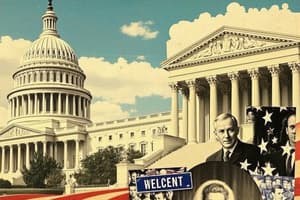Podcast
Questions and Answers
What fundamental individual liberties are outlined in the Declaration of Independence?
What fundamental individual liberties are outlined in the Declaration of Independence?
- Equality and justice for all
- Life, liberty, and the pursuit of happiness (correct)
- Freedom of speech and religion
- Right to privacy and property
Which document established the legal separation of the colonies from Great Britain in 1776?
Which document established the legal separation of the colonies from Great Britain in 1776?
- Bill of Rights
- Universal Declaration of Human Rights
- Declaration of Independence (correct)
- U.S. Constitution
What are human rights essential for according to the text?
What are human rights essential for according to the text?
- Political power and influence
- National security
- Economic prosperity
- Human dignity and self-fulfillment (correct)
Which international organization adopted the Universal Declaration of Human Rights in 1948?
Which international organization adopted the Universal Declaration of Human Rights in 1948?
What are unalienable rights?
What are unalienable rights?
How do human rights differ from government rulings?
How do human rights differ from government rulings?
Which Supreme Court case ruled that state legislative districts must be roughly equal in population for fair representation?
Which Supreme Court case ruled that state legislative districts must be roughly equal in population for fair representation?
Which Supreme Court case declared racial segregation as inherently unequal and a violation of the Equal Protection Clause?
Which Supreme Court case declared racial segregation as inherently unequal and a violation of the Equal Protection Clause?
In Obergefell v. Hodges, what rights were extended to same-sex couples?
In Obergefell v. Hodges, what rights were extended to same-sex couples?
Which Constitutional Amendment was cited in the ruling of Reynolds v. Sims?
Which Constitutional Amendment was cited in the ruling of Reynolds v. Sims?
What key rights were protected in the Supreme Court's ruling on Brown v. Board of Education?
What key rights were protected in the Supreme Court's ruling on Brown v. Board of Education?
Which part of the US was slavery allowed and encouraged by many there who had segragation?
Which part of the US was slavery allowed and encouraged by many there who had segragation?
Flashcards are hidden until you start studying
Study Notes
Government Rulings and Human Rights
The relationship between government rulings and human rights is a complex one. In this article, we will discuss the historical context of both concepts and explore how they intersect in modern times.
Historical Context: Declaration of Independence
The U.S. Constitution does not explicitly mention human rights. However, it can be argued that its provisions support the existence of these fundamental individual liberties. A key document that influenced the U.S. Constitution was the Declaration of Independence.
The Declaration of Independence was adopted by the Continental Congress on July 4, 1776. While it primarily established the legal separation of the colonies from Great Britain, it also outlined three unalienable rights: life, liberty, and the pursuit of happiness. These rights are seen as the basis of human rights, which the government is obligated to respect and protect.
Human Rights: A Global Perspective
Human rights are universal, inherent rights that are essential for human dignity and self-fulfillment. They include the right to life, freedom from slavery, freedom of thought, and the right to a fair trial. These rights are outlined in various international human rights treaties and conventions, such as the Universal Declaration of Human Rights adopted by the United Nations in 1948.
Government Rulings and Human Rights Today
The relationship between government rulings and human rights has evolved over time. In the context of the U.S., the Supreme Court has played a significant role in interpreting human rights protections within the Constitution. Some key cases include:
Case One
In Reynolds v. Sims, the Supreme Court ruled that state legislative districts must be roughly equal in population to ensure fair representation, even if that means some areas have more power than others. This decision demonstrated how government rulings can support fundamental human rights like free speech, freedom of association, and equal protection under the law.
Case Two
In Brown v. Board of Education, the Supreme Court ruled that racial segregation is inherently unequal and violates the Equal Protection Clause of the Fourteenth Amendment. This decision helped advance human rights by removing legal barriers to equal opportunity.
Case Three
More recently, in Obergefell v. Hodges, the Supreme Court ruled that same-sex marriage is a fundamental right protected under the Due Process Clause and the Equal Protection Clause of the Fourteenth Amendment. This case extended human rights protections to LGBT individuals, ensuring they have the same freedom to marry and form families as heterosexual couples.
Conclusion
Government rulings play a crucial role in shaping our understanding of human rights. They provide a legal framework for protecting these rights and help ensure fairness and equality among all citizens. As we continue to navigate complex societal issues, it is crucial that we remain vigilant in upholding human rights while striving for just government rulings.
Studying That Suits You
Use AI to generate personalized quizzes and flashcards to suit your learning preferences.




